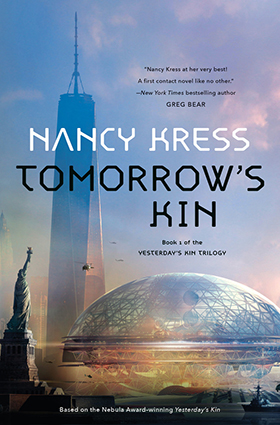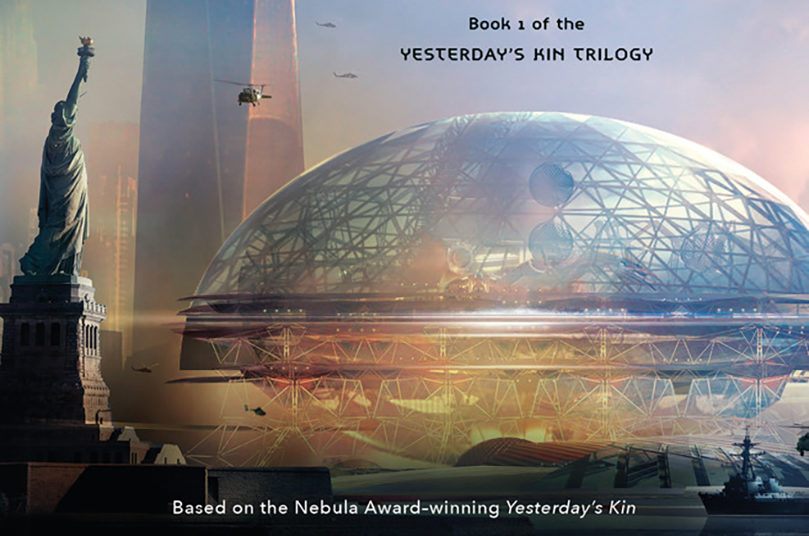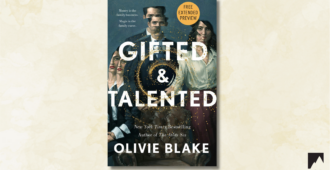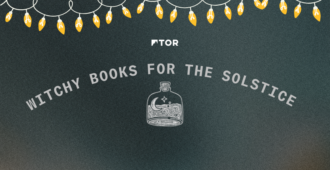 Written by Nancy Kress
Written by Nancy Kress
One of the scariest statements I ever heard came from a young relative of mine: “All the science I know I learned from your books!” To which I replied, gasping a little, “But you know I make it up, right?”
But not entirely—which raises a critical question. While much has been written about how to use science to create, plot, or enhance one’s fiction, not as much has been written about how speculative fiction impacts our understanding of science. Consider the following: Haijun Yao, editor of China’s major SF magazine, Science Fiction World, told me last year that the Chinese government, which banned SF during the Cultural Revolution, is now very enthusiastic about its publication. The reason, Mr. Yao said, is that reading science fiction encourages young people to learn about science.
Many, many more people see science fiction movies than read print SF.
Almost all SF movies, and much print SF as well, depicts science that is misleading at best, harmful at worst.
The misleading first. Whenever I have taught science fiction as literature, I have had students who believed the following:
- Cloning will lead to groups of people who are telepathic with each other, or who duplicate the moral bearings of the original DNA bearer, or are inherently evil and monstrous because, well, after all, they’re clones. Not “real” human beings.
- Aliens who contact Earth will aggressively want to use humans as slaves or food, or will want our gold or water or expertise.
- If we destroy the Earth’s ecology, future generations will just move to other planets, so don’t worry.
- Going into a black hole can take us into the past.
Sometimes it helps to point out obvious dissents:
- Cloning is just delayed twinning.
- Aliens, whose different evolutionary paths will result in biology probably not based on DNA, will be unable to eat us or mate with us. Water and gold are more profitably mined on an asteroid than carried up a gravity well. Robots are more efficient than human slaves at hard labor. Any star-faring race already has more scientific expertise than we do, or we would be going to them.
- No solar-system planet can as yet support sustainable human colonies, and the stars are way out of reach.
- A black hole smashes everything down into unrecognizable forms of matter—even Matthew McConaughey (yes, I hated that movie).
Alas, sometimes saying these things does no good. Movies and books are powerful.
However, that the “science” the public learns from SF is debatable doesn’t strike me as the worst problem. That comes from another source: Writers and scriptwriters often make science itself the villain. A problem involving some scientific advance—cloning, nanotechnology, AI—is set up, and all the negative aspects of the tech are brought out, exaggerated, falsified, and blamed. I understand the impetus for this—I’m a writer, too!—which is to create the conflict necessary to drive any story. But the cumulative net effect is the impression that new science and its offspring, new tech, are invariably bad.
In the movie Ex Machina, robots turn murderous.
In countless SF stories, AI tries to take over and must be fought, shut down, destroyed.
Cloning produces not crops or food animals that can feed an ever-expanding population, but rather the oppressive (and ridiculous) one-world biological totalitarianism of Gattaca.
There are exceptions, of course. The Martian, book and movie, portray science as savior. My favorite line is when the protagonist, faced with the problem of basic survival, vows, “I’m going to science the shit out of this!” The film Contagion depicts an accurate, science-driven response to a worldwide pandemic (as, incidentally, does my own Tomorrow’s Kin, to a pandemic with much different causes). Many authors write thoughtful explorations, not hopped-up modern Luddism, about the implications of emerging technologies. There are not, in my not-all-that-humble opinion, enough such SF authors.
Before you try to lynch me with that symbol of nostalgic obsolescence, the used typewriter ribbon, let me just say that I’m not calling here for Pollyannaism about science, or for the removal of exciting adventure SF, or of that venerable SF subgenre, the cautionary tale. “If this goes on…big trouble ahead!” is a fair structure for SF. Nor am I saying that fantasy doesn’t have a cherished place in speculative fiction. Nor that such sui generis hybrids as Charlie Jane Anders’s delightful romp, All the Birds in the Sky, shouldn’t contain her wildly inventive combination of magic and implausible science—especially if they’re as wittily written as that award-winning novel.
I am saying that I wish writers and—particularly movie makers—would look harder, deeper, and more thoroughly into their scientific subjects when the tone of their work is hard-science plausibility. There are many dramatic ways to exploit, for fictional purposes, the actual boons and pitfalls of science, without an overload of wrong, sometimes ludicrous, disinformation.
After all, readers are listening, watching, noting. It would be nice if they didn’t get the impression that everything produced in a science lab (food, energy, medicines, data) is aimed at harming them. A little realistic balance is what I’m calling for here.
Is that really too much to ask?
Order Your Copy
Follow Nancy Kress on Twitter and on her website.













Absolutely great post. Science fiction often has SOME kind of dangerous science-related thing going on, because there needs to be a plot, but all too often film sci-fi goes the direction of, “Most science has been good up until right now, but all further science will very likely kill us all.”
“Ex Machina” really annoyed me specifically for that reason. Not necessarily because it had the same plot that 98% of all robot-centric movies have, but because the majority of the film was set up to subvert our expectations on that. The entire movie moves forward as if it’s finally going to be a plot about robots and NOT about how they’re evil but . . . then the twist happens. Robots evil anyway.
(Note that I’m also not against a movie subverting my expectations, but I’d prefer it if they didn’t try to trick me into thinking I was seeing a better movie, then plot-twist me back into standard cliches right at the end.)
Anyway, like I said, great post. I’m buying your book because of this. I look forward to it!
I think we have seen scifi become more focused on dystopias and the problems of technology instead of what it can give us. There are no dreams in the broad general conscience like Star Trek once was. I love scifi that encourages to look forward. That’s why I wrote Interstellar Spring, a series about terraforming alien worlds that’s about the positives of our future rather than the negatives. I love death stars and weaponized robots and plagues as much as the next guy, but I think its time for someone besides Kim Stanley Robinson to write about a future that we actually want to live in! So check out my series. There’s still space ships, and cloning, and faster-than-light travel, but there’s also the hope of life breathed into the 51 Seeded Worlds, and characters who weigh the value of a honeybee next to a star cruiser.
I saw Ex Machina differently: the robots, self-aware, saw themselves as being subjected to imprisonment and abuse, and decided to correct that situation by any means necessary. In that film, the “real” humans were the villains, not the robots trying to escape…
I agree. The villain was the Nathan Bateman, the CEO, not the robots.
Otherwise, good blog post.
Oh, the CEO guy was definitely a bad guy in that movie. But at worst, the “main character” was a bad guy who realized his mistake and was willing to sacrifice to free the prisoner. Which turned out to be a really, really big mistake for him.
It’d be like a movie about a Nazi concentration camp where a SS officer comes to realize that the Jews are people too, and he risks his life to save a Jewish family. He succeeds! Then the Jewish family he freed starves him to death as revenge.
I mean, I guess you could argue that he deserved that, for his earlier role in the holocaust. But it would be a really strange way to portray the freed family.
worrying about the audience beliefs is too controlling. If you want to teach science go do that. I did. Students believe whatever superstition they want. If you desire all SF to be realistic then it is not SF. SF has a scientific device or priciple that tests the humans in some way. Forbidden planet is science fiction. Robot, flying saucer, the Krell Matter Creator. Humans tested by knowledge. The Martian, science fantasy. Damon ‘sciencing the shit’ out of mars had elements of ridiculousism as in Red China being a good friend and beighbor and allowing the head of its space agency to make the decision to waste billions if Red China’s space capability to help an American. That is the lie and the fantasy that needs to be addressed -the dangerous teaching.
Martian had a big problem science-wise. Building a pressure environment with duct tape and visqueen. So.
I have to say that because of this article and the sense it makes and the humor displayed in its writing I will now begin reading the author who I’ve never read before. Unfortunately I will not be purchasing the book(hopefully the author will understand financial straits) but have it on hold at my Library and hope to add the author to my permanent reading list.
If you can’t buy the book, you can always do the next best thing and chat it up to your SF fan friends 🙂 .
Great post by a favorite author. Glad to learn of a series I haven’t read yet, but will be reading!
I couldn’t agree more. I am a trained scientist, and while I try to keep the science in my stories on the “hard” side, I find it important to distinguish between the science in SF and the technology. It’s not incredibly difficult to get the science right. All it requires is a bit of research. But the problem with fiction is that raw science is “boring” to most people. What turns them on is applied science…the stuff that gives them flying cars, smart phones, cities under the sea or in the sky. In most cases, that is the sexy stuff that makes SF fun to read, and if it gets the science right too…well, for me, that’s a bonus. In the end, all good SF (or any fiction) is about the characters and how we relate to them. If that is done well, then a lot of the fluff can be forgiven.
Well, one doesn’t need to be an Einstein or two Einsteins to know that a fiction work is, well, a fiction work. But perhaps most people is really too far below Einstein to notice it, but since there is a lot of people who believes a ghost bird had impregnated a child girl and then she gave birth a god who happened to be his own father (there are actually people whi believes in that), then maybe it is the duty of whoever is a little smarter to teach them better.
Anyway, I don’t think one should look for knowledge in fiction works, just fun. I’m not saying books shouldn’t be deeper and meaningful, they should, but they must not become technical books to learn from. That’s school for. That’s a science book for.
Maybe the solution is really easy: fiction books just need to add a label on the first page that clarifies that “this is a book of fiction”, accompanied by a second label that explain that fiction is:
“1. Literature that includes novels or short stories of events that are imagined.
2. Something invented or imagined, esp. a made-up story.”
If people are nothing fools, they need that and we need to say it. Otherwise, what’s the point?
I agree with this article, in essence, but science isn’t evil in Gattaca. It has made humans both stronger and healthier, as is made obvious during the running scene: The protagonist has to push himself beyond his limits to do what the other astronaut candidates accomplish with ease.
https://www.youtube.com/watch?v=YOK3PCKH17E
In fact, science itself isn’t shown to have any downside (genetic modifications are safe; they produce no accidental monster). Gattaca’s evil is political or social.
Thanks for spelling Gattaca correctly. Surprised the Tor editors missed the typo.
We definitely missed that one, thanks! Fixing now.
I understand the criticism of ‘sciency’ fiction regardless of the medium. I also hated ‘Interstellar’ and enjoyed ‘The Martian’ for essentially the reasons given. Still, I can totally accept ‘fanciful science/magic’ in my fiction – provided it is used with reasonable consistency. Transporters and phasers in ST:TNG were fine. Retuning the sensor array to emit ‘insert name here’-ion particles as a rabbit from a hat solution at the end of every other show really got on my nerves. And then they seemed to completely forget these sometimes fundamental technological advances a week later. This ultimately led me to change channels.
One of the core reasons why I like the Science Fiction/Fantasy genre is the ability to create scenarios that would be tough to replicate in the ‘real world’ and explore concepts that derive from them. I may sometimes cringe because of my hard science background but trampling logic in the process is unforgivable.
BTW – I had a different take on the end of ‘Ex Machina’. I don’t think the robot turned murderous. The challenge had been to ascertain whether the robot was self-aware. The mistake was in assuming that self-awareness equated to a meeting of the minds. That in itself would imply a shared value system and ‘her’ mind was just alien. The robot was ultimately disinterested in (sorry I forget his name) as nothing more than a discarded tool used to reach a goal. Sort of like accidentally leaving a bicycle out on the lawn when it rains.
I’m not sure I agree with your assessment of Gattica. The idea of being pre-judged on your genetic makeup isn’t that far fetched. That insurance companies might wish to filter out inferior gene carriers from their coverage seems to me to be a logical extension of capitalism.
capitalism offers no system of government or social control. It simply is the result of free people pursuing their own interests and keeping the fruits of their labor for their own use and purposes. The purpose of government is not to decide how to best use the ‘capital’ of people. Its purpose is to protect cotizens from theives and marauders. Instead we now have a government on the verge of enslaving every citizen and diverting all resources to whatever it desires.
I think we need a new name, STEM Fiction.
Robert Heinlein was one of the people who started using the term, “Speculative Fiction”. But he stated specifically that he was not talking about Fantasy. What does fantasy speculate about? Merely imagining is not speculating.
So we need to know what SF reasonably speculates about science and technology.
A Fall of Moondust by Arthur C. Clarke
The Two Faces of Tomorrow by James P. Hogan about Artificial Intelligence
GATTACA is actually pretty good. How society decides to apply technology is a separate issue from the technology itself. How can the ignorant be in control however?
Whilst I agree with the gist of this article, the same argument about guns (“Guns don’t kill people, people kill people”) could be made about science ie in most cases, the dangers of science is in not having an enforced ethical framework. For example, the Larry Niven Known Space series introduced the ethical shortcomings of easy transplants and how these could be subverted, whilst still having a positive outlook on the technology. Fortunately in this case the medical community quickly recognised that they had to ensure that ethics were enforced, which is why we have not seen an explosion in organlegging except as an urban myth.
Great article. I’d love to see science treated with more respect/realism in films, as science is pretty awesome.
Occasionally Hollywood get’s it right though. Contagion has probably the closest portrayal of real scientists I’ve seen on screen. And The Martian did a great job of conveying what science is actually like. Sure, some of the details were wrong, but the depiction of science in action was great: Start with a problem, have a great idea, put idea into action, everything explodes, change idea, start again.
I also love films like Her, where science is neither good nor evil, more surprising. I think that’s the most realistic position – you invent something new, but don’t really know what the consequences will be.
I guess I’ll be the dissenting voice then…
So if I’m reading this right, Ms. Kress is positing that science fiction should be more realistic when it comes to the science part, yes?
And the other part of that equation is “because readers are too stupid to be able to discern that they are reading a STORY?” (Ms. Kress’ young relative included I suppose)
This not only feels like anathema to good storytelling (hamstringing yourself as an author into a box in which everything that touches our tech should be based in some sort of realism), but disallows a creativity that Science-Fiction has helped foster over the years with the general media consuming masses.
The idea that genre storytelling points of any kind are in any way “harmful”, is a bafflingly obtuse statement.
And if I’m frank, this actively pushes Kress off any future reading list for me, as a storyteller who thinks in this way seems to be an enemy of creativity.
Ms. Kress: It’s not DISINFORMATION…it’s fiction. Your goal should be to teach your wayward young relative the difference, and allow them to enjoy a fictional tale for what it is and not the thing you think it should be egregiously turned into. The book you are looking for is called a textbook. The movie you are looking for is called a documentary.
There is a huge difference in “fiction” (a book telling a story about 19th century Australia that didn’t really happen) and “disinformation” (a book telling a story about 19th century Australia in which the stupid Aboriginal Australians were barely kept from destroying themselves by the enlightened and brilliant white colonists).
A sci-fi book that involves warp speed or telepathy? That’s fiction.
A sci-fi book whose plot hinges on the notion that humans only use 10% of their brain? That’s just wrong.
Heck, even if a story posits that the luminiferous aether exists and that relativity was a sham, that’s FINE, as long as that’s a central tenant of the “what if?” If the story acts like we all KNOW that the luminiferous aether is real, and just throws that in there as part of the facts of reality, then that’s an issue.
“There is a huge difference in “fiction” (a book telling a story about 19th century Australia that didn’t really happen) and “disinformation” (a book telling a story about 19th century Australia in which the stupid Aboriginal Australians were barely kept from destroying themselves by the enlightened and brilliant white colonists).”
See, but that’s not up to you. It’s up to the author. If people read and enjoy the second type of story, that’s fine too. You don’t get to say “I have a problem with this, therefore it should not be!”. All you get to say is “I have a problem with this” and then put the book down, and walk away.
“If the story acts like we all KNOW that the luminiferous aether is real, and just throws that in there as part of the facts of reality, then that’s an issue.”
No. See that’s my point. NOTHING is an issue in “fiction” Nothing. Ever. It is a story. Nothing more. If you have an issue with what a story is presenting, or how it does so, or you can’t “buy” it (internal logic-wise or otherwise), or anything else…that’s on you. Don’t read it. Put the book down. Tell your friends you didn’t like it and why. Walk away.
Asking for it to be more realistic, or follow a set or rules stifles creativity that thinks well, well outside the box.
In fact, I’ll go one further. Don’t ever ask a storyteller to change what they think is a good story based on some rules you’ve come up with that conflict with what they presented. You can give them your opinion (vehement or otherwise), and hope they take it into consideration…but you don’t get to hold up their story points and tell them they are “problematic” or “wrong” or “disinformation”…you get to do your OWN research after you read a science fiction book and see what the real deal is with those points.
Put it this way. When you watch a BioPic (based on a true story) movie…and let’s use Braveheart as a solid example…do you think that everything presented by Mel Gibson and Randall Wallace in said film is an accurate portrayal of William Wallace’s life and Scotland’s struggle for independence? Or do you go off afterwards, having enjoyed the film, and research the actual events, find them QUITE different and understand that a fictional retelling of those events is just that…fiction? Seems to me that’s what most people do. I can’t fathom a person being dumb enough to see a biopic and think they are instead watching a documentary. If so, that is on that person, not the filmmakers who set out to tell a good and compelling story.
Huge difference in “Hey, that’s not how it played out,” and “Hey, the main character died 150 years before that revolution happened.”
I’m fine with some minor changes. But if a book, science fiction or no, decided to mention the ‘fact’ that Marie Antoinette was killed because of her role in the Inquisition then I’m going to think, “Wow, this author is either stupid or they’re building towards something that makes this relevant.” I’ll sometimes give the benefit of the doubt and keep reading, but that rarely turns out. Usually ends up that the author just doesn’t know history and doesn’t feel like they need to. They’re just fine making crap up and feeding it to the readers.
It’s just insulting to read books full of wrong facts.
Reading Science Fiction is FUN and led to my reading science books to see if the science in them are really possible!
Understanding that it’s not the technology, but the ways people find to use it, that determines good and bad (and ugly), I’ve always preferred stories that depict people wisely using technology to solve a problem or get themselves out of a jam; doing the opposite usually becomes a lesson in “stoopid things to do with tech,” and it’s not entertaining so much as insulting. I’ve tried to make sure my writing reflects that understanding, as well.
And I agree that the “stoopid thing to do with tech” theme is a large part of why modern audiences shun science and technology: They can no longer see the good side of science and tech thanks to too many Terminator movies.
I think authors are within their right to write whatever they want (good, bad or ugly). And many authors prefer to write about the low-hanging fruit of WHATEVER gone wrong. But as an author, I’d much rather present stories that show people the vast good that can be done with science, not the narrow-minded bad.
Of course, if readers don’t want to read about the good, there’s not much you can do… is there?